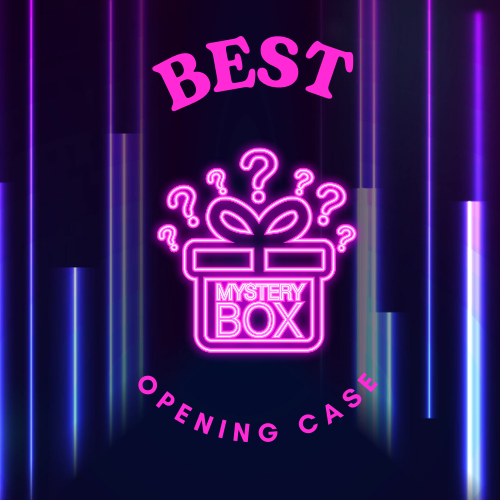The Impact of Scarcity on Mystery Box Demand: Why Limited Stock Drives Excitement

Mystery boxes have taken the online shopping world by storm in recent years, offering a unique and exciting way to engage with products. These boxes, often sold as part of a surprise unboxing experience, can range from tech gadgets and beauty products to collectibles and high-end fashion items. One key factor that makes mystery box sites so popular is the concept of scarcity—limited stock of certain boxes or items within them. This scarcity creates a sense of urgency and drives demand, making mystery box platforms increasingly competitive and enticing for customers.
But why exactly does scarcity generate such a powerful effect on consumer behavior? Why do people flock to mystery box sites when they know only a limited number of boxes are available? The answer lies in both psychology and marketing strategies that exploit human emotions and cognitive biases. In this article, we’ll dive deep into the psychology behind scarcity and its impact on the demand for mystery boxes, exploring how it influences customer excitement and the overall success of mystery box platforms.
Understanding the Psychology of Scarcity
The concept of scarcity isn’t new; it’s been a cornerstone of effective marketing for decades. The psychological principle of scarcity suggests that people tend to place higher value on things that are perceived as rare or limited. This is often referred to as the scarcity effect, a well-documented phenomenon in behavioral economics. Essentially, when people believe that a product or opportunity is in limited supply, they are more likely to desire it—and act quickly to acquire it.
Scarcity triggers a primal instinct tied to survival: the fear of missing out (FOMO). This feeling of urgency prompts people to act swiftly, making purchases they might not have considered if the product were easily accessible. In the context of mystery boxes, the thrill of uncertainty combined with the limited nature of the offer increases its perceived value. Customers are drawn to the idea of securing a rare, one-of-a-kind item that they would otherwise be unable to obtain.
How Limited Stock Creates Urgency and Drives Demand
Limited stock is a powerful driver of demand in mystery box platforms. Mystery box sellers often create excitement by releasing a limited number of boxes or exclusive variations of certain boxes. The marketing strategy is simple but highly effective: by offering a limited quantity, platforms generate urgency, and customers rush to purchase before the box sells out. This sense of urgency is further amplified by countdown timers, notifications, and announcements that tease the exclusivity of the items inside the boxes.
When customers see that only a handful of boxes are available, they feel compelled to make a quick decision. They don’t want to risk losing the opportunity to grab a coveted item or to be the one left behind when the box sells out. As a result, mystery box platforms experience rapid increases in sales, and the perceived scarcity boosts the product’s desirability.
This phenomenon is similar to how limited-edition items in fashion or collectibles work. When a product is marketed as exclusive or rare, it becomes more desirable. The same psychology applies to mystery box items. The idea of receiving a rare, hard-to-find product hidden inside the mystery box heightens the overall excitement of the unboxing experience.
Marketing Strategies: How Mystery Box Platforms Utilize Scarcity
Mystery box platforms know how to leverage the psychology of scarcity to their advantage. By using strategic marketing techniques, these platforms create anticipation and excitement before the boxes are even released. Here are some of the common ways scarcity is incorporated into mystery box marketing:
- Limited-Edition Boxes: Mystery box platforms often release special, limited-edition boxes that are only available for a short time or in limited quantities. These boxes may feature high-value items or exclusive collaborations with brands or influencers, making them highly desirable to collectors and fans.
- Flash Sales: Mystery box platforms often host flash sales where boxes are sold for a limited time or until they sell out. These sales create a sense of urgency and push consumers to act fast, which is a powerful motivator for online shoppers.
- Exclusive Releases: Some mystery box platforms offer exclusive releases that are only available to members of their VIP programs or to those who sign up for email notifications. This creates an element of exclusivity and makes customers feel special, increasing the perceived value of the boxes.
- Seasonal and Themed Boxes: By offering mystery boxes tied to holidays or special events, platforms can capitalize on the demand for limited-time products. These seasonal boxes often feature exclusive, holiday-themed items or collaborations with well-known brands, making them even more sought after.
- Countdown Timers: A countdown timer on the website or app is a simple yet effective tactic for creating urgency. When customers see that the clock is ticking, they are more likely to make an impulsive purchase to avoid missing out on the offer.
- Real-Time Stock Updates: Platforms often display how many mystery boxes are left in stock, which can further trigger the sense of scarcity. When customers see that only a few boxes remain, they are more likely to make a purchase before they are gone.
The Role of Influencers and Social Media in Scarcity Marketing
Influencers play a significant role in creating demand for limited-stock mystery boxes. By collaborating with well-known influencers and celebrities, mystery box platforms can build hype and generate buzz around their limited-edition releases. Influencers often showcase unboxing experiences of exclusive boxes, teasing the rare items inside and creating anticipation among their followers.
When an influencer announces that they are opening a mystery box with rare or limited-edition items, their followers are more likely to be drawn to the platform. The idea of potentially receiving a coveted item increases the perceived value of the box, and scarcity marketing amplifies this effect.
In addition, social media platforms like Instagram, TikTok, and YouTube play an essential role in showcasing these exclusive products. As influencers share their unboxing videos and highlight the unique items they receive, their audience is exposed to the concept of scarcity. The fear of missing out on the next big release often leads to an increase in demand and sales.
Scarcity and Its Impact on Brand Loyalty
While scarcity drives short-term sales and excitement, it also has long-term effects on brand loyalty. When customers are satisfied with their mystery box experience, they are more likely to return for future purchases. This is especially true when platforms consistently offer high-quality products or exclusive items that can’t be found elsewhere.
In the world of mystery boxes, repeat customers are highly valuable. Brands that master the art of scarcity can create a sense of anticipation and excitement for future releases, which keeps customers engaged and eager to make purchases in the long run. As customers continue to experience successful unboxings and receive rare items, their loyalty to the platform grows, turning them into advocates who help spread the word to others.
Scarcity in the Context of Consumer Behavior : The Risks and Rewards
While scarcity is an effective marketing tool, it also comes with its risks. Some customers may feel frustrated if they are unable to secure a limited-edition box, leading to negative perceptions of the platform. In some cases, platforms may even experience backlash if they are perceived as using scarcity tactics solely for the sake of creating demand without offering sufficient value.
However, when done right, scarcity creates excitement and drives sales, benefiting both consumers and platforms. The key to balancing scarcity marketing lies in delivering genuine value to customers. If platforms offer high-quality, exclusive items inside their mystery boxes, the scarcity will feel justified, and consumers will be more inclined to participate in future releases.
Scarcity has a powerful impact on the demand for mystery boxes, driving consumer excitement and increasing sales. The psychology of scarcity taps into our innate desire to secure rare and exclusive items, creating a sense of urgency that compels us to act fast. Mystery box platforms use various marketing strategies, such as limited-edition boxes, flash sales, and influencer collaborations, to capitalize on this psychological principle and boost demand.
As mystery box platforms continue to refine their marketing tactics, scarcity will remain a central element of their strategy. By understanding how scarcity influences consumer behavior, these platforms can continue to engage and excite their audience, ensuring the ongoing success of the mystery box industry.
